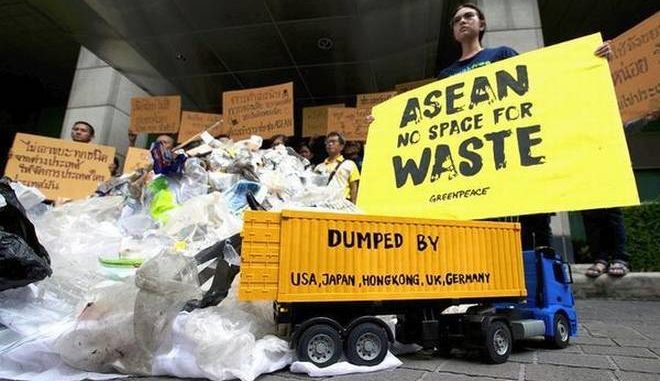
In News
In a meeting to be held at the end of the week, ASEAN nations are expected to sign ‘Bangkok Declaration’ to fight maritime waste occurring from these nations.
In-Detail
- As per 2017 Ocean Conservancy report, only five Asian countries – China, Vietnam, Philippines, Indonesia and Thailand – are responsible for half of 8 million tonnes of plastic waste dumped every year into the world’s oceans.
- The leaders of the Southeast Asian nations are now planning to sign a deal to fight maritime debris arising from their countries.
- These countries were under fire from environmental groups and global bodies for not doing enough to tackle maritime waster occurring from them.
- The countries produce large quantities of plastic and are heavy importers of trash from countries like the US and Canada.
- Now, with the ‘Bangkok Declaration’, these countries are planning to fight the maritime waste by preventing and significantly reducing it (according to the draft).
- But, activists are worried that the declaration will be a limited agenda and will not go far enough to root out the problem.
The Concern
- The draft has no clear mandate on ending the production of single-use plastic which activists say is a cause for worry. They are also worried about the issue of plastic trash imports not being on the agenda.
- Also, there are no penalties for the worst offending companies or countries that have not specified a clear plan to tackle the problem in the draft declaration.
Impact on Marine Ecosystem
- Marine debris has devastating effects on marine ecosystems.
- Whales, turtles, sea birds and numerous fish turn up on the beaches dead with plastic-laden in their stomachs.
- The menace of plastics has even reached the great depths of our oceans. It is leading to a huge loss of marine biodiversity.
Sincere Efforts
- The problem needs an urgent solution and sincere efforts of the world nations are necessary in this regard.
- The Bangkok Declaration though appears to be a promising first step by ASEAN nations, much needs to be done to tackle the problem at a brisk pace.
India Scenario
The long coastline of India is replete with marine debris. Majority of the trash in the country finds its way into the surrounding oceans through river discharge. It is severely affecting the local marine ecosystem and reducing the population of important fish species leading to a loss of livelihood for our fishermen.
Though environmental laws prevent dumping of waste into the oceans, implementation of the laws and non-usage of technological advancements are leading to pollution of Indian coastal waters.
Signs of government waking up to the threat of marine debris is appearing in the form of India’s partnership agreement with Norway in January 2019 to combat marine pollution. Also, the ‘Shared vision of India-Indonesia Maritime Cooperation in the Indo-Pacific’ in 2018 called for greater cooperation between the two countries in tackling marine pollution.
Such bilateral efforts are a good start but India needs to start solving the problem of marine pollution internally first.

Leave a Reply
You must be logged in to post a comment.